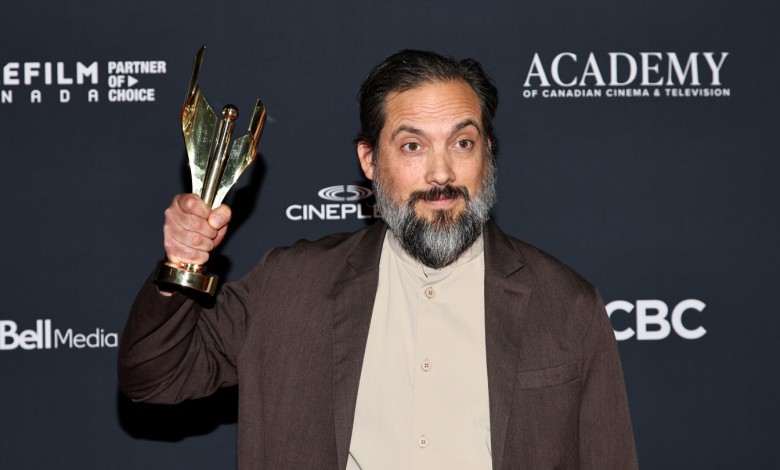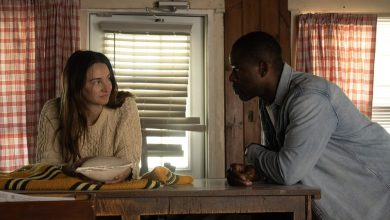The Apprentice Producer Daniel Bekerman Trump’s Movie Legal Threat

Any indie film producer can find themselves in the eye of a culture-war storm — but Daniel Bekerman got blown off course by the most powerful man on Earth.
The founder of Scythia Films, a Canadian indie studio, recalls a valuable lesson learned when lawyers for Donald Trump began sending cease-and-desist letters in an effort to block the U.S. release of The Apprentice, the Oscar-nominated Trump origin story.
“The current president is primarily in the entertainment business more than the politics business. Those letters were for entertainment purposes. You could tell by their lack of seriousness,” Bekerman tells THR ahead of leading a conference panel on indie film at the Toronto Film Festival.
Scythia Films — with offices in Toronto, Vancouver, Winnipeg and Los Angeles — is one of Canada’s largest indie studios. The company develops original features while also offering production services, assisting U.S. studios filming in Canada in a way that allows them to retain full ownership rights.
In addition to The Apprentice, which stars Sebastian Stan and Jeremy Strong (both Oscar-nominated for their performances), Bekerman’s recent producing credits include Guy Nattiv’s Love and Light (working title), starring Lily James; Viggo Mortensen’s directorial debut, Falling; Endless Cookie, which premiered at this year’s Sundance; I Object, directed by Oscar nominee Andrew Niccol and starring Anna Faris and Karl Urban; and Close to You, directed by Dominic Savage and starring Elliot Page.
Bekerman sat down with THR to discuss the potential — and perils — of independent filmmaking in a disrupted industry.
You do original movies and are a key service production company in Canada. How have each of those businesses been impacted by increased industry disruption, including from Hollywood?
We have these two sides of the business. One side is effectively the service productions, where we do the physical nuts and bolts of facilitating production. And the other is developing our own films. So we do both, and, especially for the creative side, it was important for us to have a presence in L.A.
And you’re based in Vancouver, where you can drive both sides of the business, original and service work?
There’s enough work for me to just stay in Canada, where I don’t need to think about relocating and [designing] all my stories to being just from the Hollywood machine. It’s always case by case. But what I do want to advocate for in general is having that diversity of storytelling and storytellers. If it’s all being made by one source, whether it’s a company or a government or anybody else, it’s going to become thin after a while.
You also in a sense have a third leg of the stool — international co-productions — some of which involve American partners. How is that impacted by our disrupted times?
You’re right to point out that third component, which usually falls under the original, creative producing side of things. Sometimes it’s more like service production and a minority co-production scenario. But what’s going on is very complex, but you can break it down to the simple principles of stability and instability of business. You can have instability in the business, or you can look for stability. And there’s a lot of instability in the market. That’s where international co-productions can come in and potentially offer stability with legislated agreements between nations that have consistent and fulfilled parameters for getting projects made. But these are not separate from the market entirely. They do augment other forces in the market. So having the ability to access the international treaty co-production system can be something of a remedy for the instability in the rest of the market.
Making movies has never been easy. But do you find conversations to structure indie films just take longer these days, given all the industry disruption?
I would say there’s increased curiosity and interest in the these other systems, these international co-production systems, and the Canadian system. I’m paying attention to where the energy is. That’s in the market and in the public consciousness because we’re in the storytelling business. Sometimes we forget the source of our stories is the world. Right now, I find the institutional entertainment companies becoming increasingly conservative, increasingly homogenized. Their parameters for stories they’re telling and how they’re telling them are narrower, and increasingly they’re trying to color within the lines of what will be deemed acceptable by certain power structures that prevail in today’s world. In light of that, where I see this vacuum, where I see energy and opportunity, is in actually going in the other direction and telling stories that are as bold as possible, that are as honest and unvarnished as possible in the subject matter they tackle. And that has the capacity to excite audiences in a way that they’re not getting from the kind of overly sanitized storytelling by committee that is increasingly the case in institutional entertainment companies.
Are you speaking more about companies in the U.S., while in Canada and Europe and elsewhere producers are still able to tell the stories you covet?
Absolutely. We faced this very specific kind of pressure with our movie, The Apprentice. The movie surprised a lot of people in that it was not just a movie about Donald Trump. It had a lot to say and was not just an easy set of political talking points. It was a good piece of art. And the pressure we faced was not a unique occurrence. There is a new wave of pressure, like what’s happened with Stephen Colbert. There’s other examples of that. But also, the industry spent several years telling filmmakers who had been historically shut out of telling their stories — in many cases, these are Black filmmakers, Indigenous filmmakers, queer filmmakers and women filmmakers — that their stories should be told and will be told. And then as soon as the political winds start blowing another direction, there’s corporate amnesia. Perhaps we were naive to take some of that corporate speak at face value in the first place. But frankly, it’s not acceptable because there’s a reason why it was a good idea to start telling stories that hadn’t been told and to give voice to storytellers who had struggled to have their voices heard.
Do you sense big media companies have kind of scrubbed their websites of anything mentioning DEI but are still looking for fresh stories from diverse storytellers?
I know there are incredibly talented individuals working at those companies. So I don’t want to paint with too broad a brush because many people at those companies are great at their jobs. But I think because of the top-down structural movement away from certain kinds of stories that is clearly happening, I look at it more as an opportunity that they’re vacating a space in the spectrum of stories that are being told, a very large space that has a lot of energy in it. And people willing to just have a smidgen of boldness can go straight into that space and tell amazing stories.
With The Apprentice, you famously were served with a cease-and-desist letter from Donald Trump. What did you learn from that experience?
I would say that was the beginning of a learning process about the degree to which the current president is primarily in the entertainment business more than the politics business. Those letters were for entertainment purposes. You could tell by their lack of seriousness. There’s just silly claims, silly anecdotes that are designed clearly to play to an audience on Fox News. They might get someone’s blood boiling because they’re the greatest hits of things that get those audiences angry. But they lack legal substance, they lacked logical substance.
As a storyteller, you recognized in that legal threat from Trump an appeal to his base?
This sounds like I’m being dismissive. I’m not, because when I say he’s in the entertainment business, people underestimate the entertainment business and its potency. Most people think of entertainment as a bag of popcorn. It may be. But it’s also these stories. And this is what Trump understands very well, the power of storytelling. Because people live their lives along the lines of the stories they integrate into their lives. That can be all forms of stories. It can be any kind of story. And this is something the president is an expert in, in how to utilize that power of storytelling.
And The Apprentice was a harbinger for a Trump administration wanting to control the narrative?
It was a canary in a coal mine moment. Some of the things we’re seeing now, including Stephen Colbert, what was happening with our film, this was an early indicator that there was an intense interest on the part of the administration to control what stories could be told and who could tell them.
He understands the power of framing how people see the world through storytelling.
Absolutely, that’s what stories are. From the time when people first started scratching into the cave walls. Their stories were about how to survive in the world and how to prioritize your life in the world and give order to our lives. By calling them stories, I’m not diminishing them. This is what I’m passionate about in doing this work. It can be incredibly positive, and you can gain incredible insights into yourself and into humanity in general through great storytelling.
So you see your movies opposing presidential propaganda and its capacity to influence people’s lives?
I believe we’re in a contest between two fundamental kinds of storytelling. One is determinative, and the architects of that story already know the morality contained in the story, with the objective to lay out a moral system. The other kind of storytelling is more about curiosity, more about exploring the human condition. That’s the kind of storytelling I aspire to. It’s the kind of storytelling in The Apprentice. We took a subject that happened to be named Donald Trump, but what we were interested in wasn’t telling everybody what we already knew about Donald Trump. We were exploring the human being and what it says about all of us that there’s this person who devolved into the person we call Donald Trump. What does that mean for all of us on a human level? That was an exploration. It was going into a deep, dark cave and trying to shine a light on something that lives down there — that’s the objective of this kind of storytelling.
You just completed a movie in southern British Columbia, Love and Light, directed by Guy Nattiv. What brought you to that project and others like it?
So a movie like Guy Nattiv’s project, in certain ways, it’s very personal to Guy in ways that I actually really relate to. It’s that kind of storytelling where you are exploring characters. And you’re finding surprises. You’re really, really finding things that are surprising and sometimes uncomfortable. But they have a lot of energy in them. And this is so much more interesting to me as a person. And that difference between that kind of storytelling and what is essentially propagandistic storytelling has never been so clear to me.
Source: Hollywoodreporter
HiCelebNews online magazine publishes interesting content every day in the movies section of the entertainment category. Follow us to read the latest news.
Related Posts
- Josh O’Connor (left) and Daniel Craig in 'Wake Up Dead Man: A Knives Out Mystery.'
John Wilson/Netflix © 2025
…
- Creative Arts Emmys: ‘Rebel Ridge’ Wins Best TV Movie
- America Ferrera and Matthew McConaughey in 'The Lost Bus.'
Apple TV+
…
- Toronto: A Desperate Mother, Indigenous Tradition and 3,000 Guests Spell Chaos in ‘A Sami Wedding’ Trailer (Exclusive)
- 'Canceled The Paula Deen Story'
Share on Facebook
…





